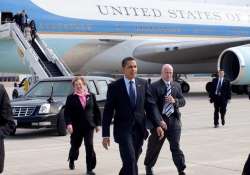Barack Obama leading delegation of US dignitaries to Saudi Arabia
New Delhi: President Barack Obama will lead a delegation of lawmakers, senior U.S. officials and two former secretaries of state to Saudi Arabia on Tuesday to pay respects to the royal family following King Abdullah's

New Delhi: President Barack Obama will lead a delegation of lawmakers, senior U.S. officials and two former secretaries of state to Saudi Arabia on Tuesday to pay respects to the royal family following King Abdullah's death.
Obama was cutting short the final day of his visit to India to make the trip to Riyadh, the capital of the oil-rich desert kingdom. He had planned to close his three days in India with a visit to the famed Taj Mahal, but will instead make a four-hour stop in Saudi Arabia to meet with new monarch King Salman bin Abdul-Aziz Al Saud and attend a dinner with other Saudi officials.
Secretary of State John Kerry was joining Obama in Riyadh, along with former Secretaries of State Condoleezza Rice and James Baker. Former White House national security advisers Brent Scowcroft, Sandy Berger and Stephen Hadley were also making the trip, as was Sen. John McCain, R-Ariz. Several lawmakers who traveled with Obama to India, including House Minority Leader Nancy Pelosi, D-Calif., were also joining him in Saudi Arabia.
The visit by the president and a high-level delegation underscores the key role Saudi Arabia plays in U.S. foreign policy in the Middle East. Most recently, Saudi Arabia became one of a handful of Arab nations that have joined the U.S. in launching airstrikes against the Islamic State group in Iraq and Syria.
The 90-year-old Abdullah died last week after more than two decades at the helm of oil-rich Saudi Arabia. He ascended to the throne in 2005 but had been de facto ruler for a decade before that.
Saudi Arabia's new king is a veteran of the country's top leadership, versed in diplomacy from nearly 50 years as the governor of the capital Riyadh and known as a mediator of disputes within the sprawling royal family.
Salman, 79, had increasingly taken on the duties of the king over the past year as his ailing predecessor and half-brother, Abdullah, became more incapacitated. He takes the throne at a challenging time for the kingdom, as oil prices tumble and the U.S.- and Saudi-backed government in Yemen implodes.